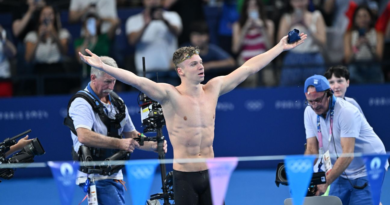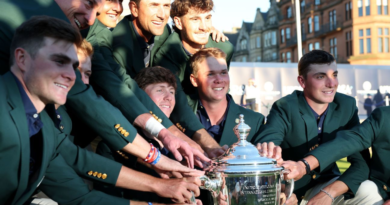Despite first-round exit, Rafael Nadal's legacy at the French Open remains unparalleled
PARIS — THE CHEERS and shouts of “Vamos Rafa!” started even before the first glimpse of Rafael Nadal on Court Philippe-Chatrier. Just like in previous years, the crowd roared ever louder as their hero warmed up, against the backdrop of stadium announcer Marc Maury reading out his incredible list of French Open triumphs.
But as the match went on against Alexander Zverev, the cheers switched from those of excitement to nervousness, and as it slipped away from Nadal, the crowd tried to will him on.
If this does prove to be Nadal’s final swing at the French Open men’s singles title, then he went down fighting against Zverev. Though Nadal has been at pains all week to play down the notion of this fortnight in Paris being a destination on his farewell tour, there was a feeling of finality. His old foe Novak Djokovic was in the crowd. His fans and Grand Slam winners Iga Swiatek and Carlos Alcaraz were there too, not a seat free on this showpiece court at Roland Garros, for a first-round match. They all collectively hoped for one last Nadal hurrah — just like Serena Williams‘ fans did at the US Open in 2022.
But tennis is brutal, and there is little room for sentimentality. For all of Nadal’s attempts to claw back into the match, the trumpet fanfares, the red and yellow flags in the crowd, and moments which were inescapably reminiscent of the Nadal of old, there would be no final flourish at Roland Garros. For this year, at least.
“If it’s the last time that I played here, I am at peace with myself,” Nadal said. “I tried everything to be ready for this tournament for almost 20 years. And today and the last two years I have been working and going through probably the toughest process in my tennis career, with the dream to come back here. At least I did that. I mean, I lost, but that’s part of the business.”
EVER SINCE NADAL made his debut here in 2005, winning the men’s singles title the same year, this place has become synonymous with him. His record is frankly ridiculous: winning 14 singles titles, a record of 112 wins in 116 matches, translating to a win percentage of 96.5% — the highest winning percentage of any singles tennis player in a major. He managed to win the 2008, 2010, 2017 and 2020 tournaments without dropping a set. His defeat to Zverev means Nadal has only ever lost to three men here. Zverev now sits alongside Robin Soderling (fourth round, 2009) and Djokovic (2015 quarterfinals, 2021 semifinals) in having defeated Nadal in Paris.
All of that has transformed him into this legendary figure, yet the beauty of it is, unlike with many masters, you can still witness his craft: He’s still there in front of you, unleashing that famous forehand, complete with the familiar pre-serve setup routine.
“I consider myself lucky that I’m here, that I can still see him, in the locker room or in the players’ restaurant, or seeing him practice with the passion he has — it’s amazing,” Jannik Sinner said Friday. “He’s for sure the biggest inspiration we have in our sport, no?” For further evidence of the love that surrounds Nadal, take Alize Cornet’s reaction to a good luck message he sent to her ahead of her retirement.
But whether this is the last time we’ll see him in the French Open, only he knows. He has been reluctant to surrender any control over his fortunes here — even to the extent that he reportedly lobbied to have his first-round match in the afternoon, rather than the showpiece evening slot. Those are his preferred conditions — less humidity, lighter tennis balls.
“Roland Garros is the most important tournament of my tennis career, and all the things that I lived there, enjoyed there, stays in my heart forever.”
Rafael Nadal
For so long, this seemed likely to be his last hurrah. That was the narrative anyway, ever since he announced in May 2023 that he was pulling out of the French Open (subsequently spending the rest of the year sidelined after hip surgery) and in that same news conference saying 2024 would likely be his “last year” on tour.
“I don’t think I deserve to end like this,” he said at the time, sitting in his tennis academy in Manacor, Spain. He wanted to finish his career on the court one final time, sweaty and exhausted.
That news conference teed up this season as his farewell tour; it was certainly enough for the organizers of the French Open to plan a goodbye ceremony for Nadal this year. But then came the curveball. On Saturday — in front of a standing-room-only news conference — he added his own topspin to the debate over his future. He took control of the narrative: no longer was this a long goodbye, but instead, he opened the door to playing on beyond 2024.
“It’s a big, big chance that it’s going to be my last Roland Garros, but if I have to tell you it’s 100% my last Roland Garros, sorry, but I will not, because I cannot predict what’s going on.” He added he didn’t want to “close 100% the door,” saying he was enjoying his tennis, loving having his family with him on tour and still figuring out what his body can handle.
HE CAME TO the French Open in patchy form — 5-3 on clay this year — as he recovered from an abdominal injury that cut short his hard-court season at the start of the year. He was forced to sit out Monte Carlo, and his withdrawal sparked concerns he wouldn’t be fit in time for Roland Garros. “My body won’t let me [return],” Nadal said at the time. “It’s getting difficult for me. It’s been a difficult year and a half, I’m trying every day.”
But he did make it back in time for Barcelona, where he lost in the second round to Alex De Minaur. In Madrid, he faced De Minaur again and won in straight sets, but still, he wasn’t sure if his body could manage Paris.
“It’s difficult to understand some things, but for me, Roland Garros is the most important tournament of my tennis career, and all the things that I lived there, enjoyed there, stays in my heart forever,” Nadal said in Madrid. “So it is not a thing about losing or winning. It’s about going on court there with the feeling that I can fight and I can be competitive and, you know, let’s go on court and dream about what can happen.”
He’d eventually lose in the round of 16 to Jiri Lehecka, while in Rome he was picked apart by Hubert Hurkacz in the second round in straight sets. All the while, people were saying goodbye to him: At the Madrid Open they unfurled a banner saying “Gracias Rafa,” recognizing his five wins there.
But amid all the nostalgia overload and unpredictable form was a resolute Nadal, focused on adding his 23rd Grand Slam title. A source close to Nadal told ESPN that in the lead-up to the French Open he was training, without pain, three hours a time and was building confidence. He came into the tournament unseeded, ranked 272 in the world, but not one player on the men’s draw would have wanted to have drawn him. Alcaraz was asked whether he secretly wanted to draw his hero Nadal in the first round. “No, honestly,” he answered, smiling.
The players are fully aware of the aura around him at Roland Garros. “You’re not playing the statue, you’re playing the actual person. But you are playing Rafa Nadal,” Zverev said before their first-round match. “For me, in my mind, I’m going to play peak Rafa Nadal. That’s what I expect him to be. I expect him to be at his absolute best. I expect him to play the best tennis he’s played in a long time on this court.”
Playing Nadal at Roland Garros is as much a mental task as it is skill. “He has the capability to spin the ball not like other players,” Daniil Medvedev said. “Getting these high balls, especially on clay, is not easy. Then we go to where he fights for every point, he brings intensity to every point. You know you’re going to be tired, you know it’s going to be tough. It’s not easy. Rafa will always be Rafa.”
Stefanos Tsitsipas, talking in Monte Carlo in mid-April, summed up what it’s like to play Nadal. “I think he’s the ultimate challenge on clay.”
That’s what it comes back to, that expectation that regardless of what shape he’s in or his previous run of form, at Roland Garros, he finds a way to make it work. He came into the 2022 tournament with a 4-2 record on clay that year and ended up winning the whole thing, despite a foot injury.
The players don’t forget moments like that. “Regardless of the fact that he hasn’t played much, he is who he is in Roland Garros,” Djokovic said.
NADAL WILL FOREVER be a legend at the French Open. It’s just a question of whether we’ll see him again in this tournament. His old sparring partner certainly hopes so.
“If he says ‘ciao,’ he will do it on a court and not on his couch, and I love that because he is very far from being 100%,” Roger Federer said on the French TV program “Telematin” earlier this week. “I don’t know anything, but I would like it to end as he has decided, with his family and his team. I would like him to continue on the circuit a little longer than people believe.”
The same goes for Nadal. As he faced a still-packed Court Philippe-Chatrier after his defeat to Zverev, he wasn’t ready to say goodbye. He’d just battled for 3 hours 5 minutes against one of the best in-form players in the world right now, and ran him close. Those are the sorts of matches which make it even harder to say goodbye.
“There’s a big percentage I won’t be back here, but I can’t say 100%,” Nadal told the crowd. “The body is feeling a little bit better also. Maybe in two months it’s enough, I can’t give anything else, but it’s something I don’t feel yet. I hope to be back on this court for the Olympics, that’s motivation.”
Up in the audience, his wife, Maria, and son, Rafael, watched on. Nadal is still focusing on the next goal, looking to eke one last bit of magic out of his tiring frame. But regardless of how things end up, whether he calls time after the Olympics, or has one final run at his beloved French Open next year, Nadal looks back with no regrets.
“I enjoyed everything,” he said. “Because of tennis I lived experiences that I never could imagine without practicing, playing this beautiful sport, and I had much more success than what I ever could dream about.
“So I had injuries, yes. I had tough, low moments, yes. But on the other hand, I enjoyed incredible emotional and positive moments that I am so grateful for, and I feel very lucky for all of that.”



